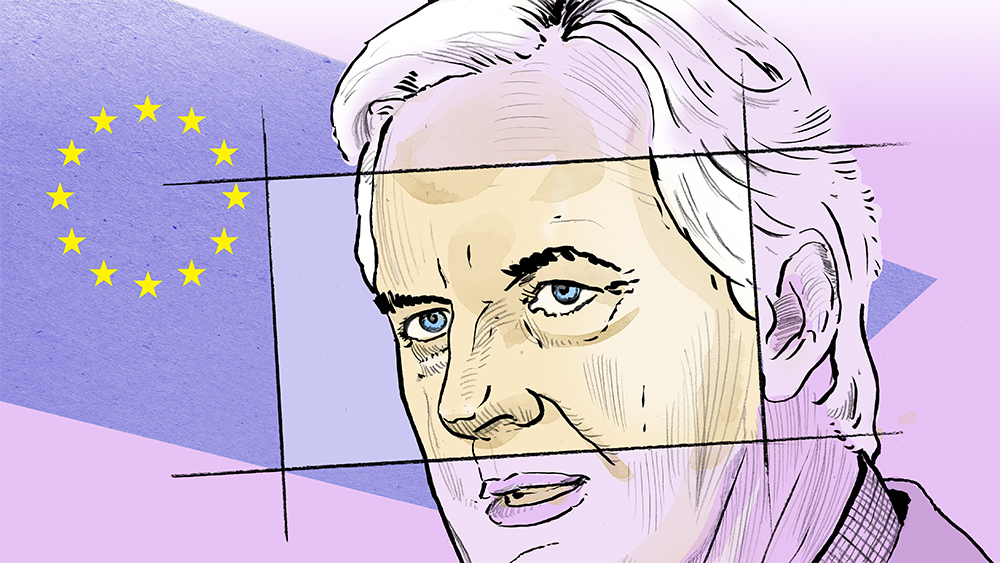British media have painted the EU chief Brexit negotiator as an inflexible ideologue. It’s a caricature few in Brussels recognize. Still, he’s unlikely to make new friends in London.
On an early May morning, amid increasing tensions between the European Union and the United Kingdom, the EU’s chief Brexit negotiator Michel Barnier found himself facing a jostling crowd of hungry journalists.
They wanted answers, and for good reason: Reports had emerged of a particularly frosty dinner between British Prime Minister Theresa May and European Commission President Jean-Claude Juncker where Barnier was also present. In an account that might have been leaked by Juncker himself, the German newspaper Frankfurter Allgemeine Sonntagszeitung (FAS) described the Downing Street dinner as an unmitigated disaster. The British prime minister was, according to the story, completely delusional about what was possible in a Brexit divorce and ill-prepared for negotiations. The incident quickly made headlines across Europe.
Under pressure from reporters, however, Barnier appeared unflustered. He insisted that he found May perfectly charming.
“On a personal basis I had the opportunity to discuss a shared passion I have with her, which is rambling and hiking in the mountains,” he said with a smile. “If you like walking in the mountains you have to learn some rules. You have to put one foot in front of the other, because sometimes it is a steep and rocky path. You also have to look for what accidents might befall you. You have to keep your breath, and you have to keep looking at the summit.”
You can take the man out of the mountains, but you cannot take the mountains out of the man. Barnier’s comments were a clear reference to his home region of Savoy in the French Alps. Nicknamed “Mr. Smooth” and “the Silver Fox,” Barnier still carries the confident charm of his native Alpine upbringing: He is tall and attractive, always well-dressed with not a hair out of place. And ever since he was appointed chief Brexit negotiator by Juncker six months ago, Barnier’s personal traits have taken on new significance.
His many years of service – he was France’s Foreign Minister and EU Commissioner with responsibility for the Single Market – have earned him a reputation for civility and businesslike deal-making; he stands in stark contrast to the rather hot-headed Juncker.
In fact, many in Brussels believe Barnier was embarrassed by the leak of May’s tense dinner, as it doesn’t match his reputation for courtesy and decorum. A good cop-bad cop dynamic is developing between Juncker and Barnier – but that may very well be by design.
The Scourge of the City
Barnier’s image in Brussels is a far cry from the picture British media painted last summer, shortly after he was named Brexit negotiator. Tom Newton Dunn from The Sun called the appointment a “declaration of war.” The Daily Telegraph repeated its 2010 characterization of Barnier as “the most dangerous man in Europe.” The Daily Mail called him “inflexible” and his assignment “an act of petty aggression” by the EU. He was said to be hostile to the Anglo-Saxon brand of capitalism and to bear grudges against both London and Washington.
Barnier is used to such hostility. He has spent most of his career negotiating difficult compromises at sensitive times. He is no stranger in Brussels – in fact, this is his third stint in the EU capital. He served as EU Commissioner for Regional Policy between 1999 and 2004 and, most memorably, as Commissioner for the Internal Markets and Services – the EU’s finance chief – from 2010 to 2014. When not in Brussels, he was in Paris serving as a minister in various center-right governments.
It was during his second term with the Commission that he made an impression in London, Europe’s foremost financial hub. When Barnier became the EU’s finance chief, it fell to him to clean up the mess of the 2008 debt crisis and prevent it from being repeated. But his efforts to regulate banks, markets, and hedge funds ran into fierce opposition. When he took the train to London and crossed the channel, he knew he was entering the lion’s den. Deemed the “scourge of the City,” he spent countless late nights there negotiating financial services reform.
Many were initially distrustful, not least because France’s leader at the time, President Nicolas Sarkozy, had called Barnier’s appointment a “defeat for Anglo-Saxon capitalism.” But Barnier proved to be far less an ideologue than Sarkozy projected. Former colleagues remember him as a fair dealer and a good listener. His central concern was to work for the best interests of Europe, and that did not involve dealing grievous injury to the bloc’s most important financial center.
Arlene McCarthy, a former MEP from the British Labor party who worked closely with Barnier on financial services reform, says the reaction she saw to Barnier’s appointment last year sounded familiar. “I’ve known him for twenty years, first as regional policy commissioner,” she said. “When he was appointed for financial services in 2009 people in the UK said this was the worst thing ever, because he’s a French commissioner, but I don’t think any of that was true.”
“People are saying these things because they don’t actually know him,” she added. “Yes, he’s charming, but he’s also formidable, and very focused. I think he’s a fair negotiator. You’ll never ever find him raising his voice; he’s always very calm. But he’s not a pushover.”
Kay Swinburne, a British Conservative member of the European Parliament’s economics committee, also worked closely with Barnier during the contentious financial negotiations. “He was a charming and honest broker,” she remarked. “He was always willing to get into the substance of an issue and understand different perspectives so as to rise above political differences to get the best outcome.”
In the end Barnier made plenty of concessions to the City of London. He promoted the right of London-based hedge funds to operate across the EU and gave the UK an exemption to the EU’s proposed bank ring-fencing rules.
Spare Me the Details
People who worked with Barnier describe a seasoned operator who loves politics but not the nuts and bolts. He contradicted the British cliché of the nerdy, detail-obsessed Eurocrat. One Commission official recalls that he would have his staff draw up a list of the key briefing points on small, laminated card to keep in his pocket for meetings.
Mark MacGann, one of Brussels’ most high-profile lobbyists, recalls working with Barnier when he was head of government affairs for the New York Stock Exchange/Euronext. They were trying to get the Commission’s green light for a merger with Deutsche Börse. It was politically unpopular, due in part to Europeans’ lack of trust in the American NYSE. In the end the Commission voted it down. But Barnier was the one voice of dissent in the 27-member college of commissioners, and such opposition is uncommon.
“The guy really believes in sticking his neck out for European interests,” said MacGann. “Right up to the end, he wanted recorded in the meeting that he opposed this decision, that it was the wrong decision for European interests. This was an era when people were beating up the banks. Barnier believed in the merger when it was not the popular view and maybe not the politically expedient thing to do.”
MacGann says that he expects Barnier to conduct Brexit negotiations with the same tact and level-headedness that he displayed during his work as a commissioner. “I think he will want to make sure that negotiations are managed in a courteous, respectful, diligent manner,” he said. “He’s used to working with the French civil service, which is very structured. It’s not the Rasputin approach – you don’t embarrass people in public, you do things behind closed doors.”
A Nationalist Beginning
Following the news of Barnier’s appointment last year, Conservative MEP Daniel Hannan, one of the driving forces of the Brexit vote, called him “an old-style Euro-integrationist.” But this flies in the face of Barnier’s political origins.
The chief Brexit negotiator says he is guided by a pan-European interest now, but he was not always a champion of international consensus. He started out as a young Gaullist – a strongly patriotic movement inspired by former French president Charles de Gaulle that sees France as the center of the universe and national sovereignty as paramount.
Barnier first gained national renown when he won the town of Albertville’s bid to host the Winter Olympics in 1992, serving as co-president of the Olympic Committee during the games. But it was during this time that his commitment to Gaullism seemed to wane. He became more of an internationalist, and more interested in pan-European politics.
After serving two years as environment minister in the waning years of François Mitterrand, he then joined President Jacques Chirac’s administration as Minister for European Affairs. In 1999 Chirac sent him to be France’s European commissioner – and the rest was history.
There is no doubt that Barnier believes in the European project: He has photos of de Gaulle and German Chancellor Konrad Adenauer on his desk, after all. But to call him an arch-federalist, as some in the UK media have done, would be a mischaracterization. Those who have worked with him know him as a results-oriented consensus-builder, not a Europe-obsessed fanatic.
McCarthy believes that by alienating Barnier, the British may be losing the “good cop” on the other side of the table. “It doesn’t help to demonize him, because he’s the person they’re going to have to deal with.”
Read more in the Berlin Policy Journal App – May/June 2017 issue.








